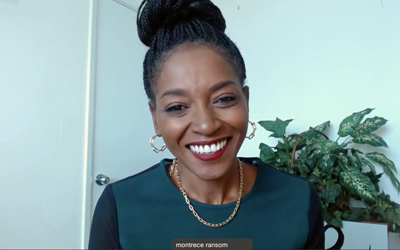
Montrece McNeill Ransom, JD, MPH, ACC, delivered her presentation, “Dying to Belong: Racism, Public Health, and the Law,” to a virtual UMB audience Nov. 16, discussing racism as a public health crisis and her experiences as a lawyer, educator, leadership coach, and belonging strategist.
Montrece McNeill Ransom, JD, MPH, ACC, is a leadership coach, belonging strategist, public speaker, author and educator, serving as a faculty member with California State University East Bay’s Department of Public Health and Walden University’s School of Health Sciences. She currently serves as director of the National Coordinating Center for Public Health Training within the National Network of Public Health Institutes.
She began her career in public health as a Presidential Management Fellow with the Centers for Disease Control and Prevention (CDC) and served in CDC’s Public Health Law Program for 20 years. The last 10 years of her career at CDC were spent serving as the team lead for public health law training and workforce development.
McNeill Ransom has published, presented, and trained on a wide array of topics. She received the Jennifer Robbins Award for the Practice of Public Health Law from the American Public Health Association in 2017 and the Champion for Diversity and Inclusion Award from the American Bar Association’s Health Law Section in 2019. She recently was named one of the five most influential female coaches of 2021 by Entrepreneur Mogul.
McNeill Ransom earned her Executive Leadership Coaching Certification from Georgetown University; her Diversity, Equity, and Inclusion in the Workplace Certification from the University of South Florida Muma College of Business; her law degree from the University of Alabama School of Law; and her Master of Public Health degree from Emory University’s Rollins School of Public Health. She received her bachelor’s degree in Speech Communications from Columbus State University.
She also is a trainer and facilitator, having received certification through the Association for Talent Development. McNeill Ransom is the lead editor of the “Public Health Law Concepts and Case Studies” textbook; president-elect of the American Society of Law, Medicine and Ethics; and serves on the Advisory Committee for the Georgia Campaign for Adolescent Power and Potential.
About the Event
Dying to Belong: Racism, Public Health, and the Law
No matter our background, ethnicity, age, gender, gender identity, or race, we all have a fundamental need to feel a sense of belonging. Human connection and relationships have the power to heal trauma, rejection, loneliness, and isolation. But so much of what is happening in our country continues to embed in the soul of many that we don’t belong. According to one study, within a week of George Floyd’s death, anxiety and depression among African Americans shot to higher rates than experienced by any other racial or ethnic group. These mental health statistics, when coupled with the disproportionate burden of illness and death among people of color from COVID-19, provide evidence of what many in public health have been saying for decades: Racism is indeed a public health issue.
To date, more than 300 jurisdictions — cities, counties, and states — have heard this call and declared racism a public health issue. These declarations are meant to catalyze change across all sectors of government and are intended to impact each of the social determinants of health — criminal justice, education, health care, housing, transportation, budgets, taxes, economic development, and social service — all toward the goal of shrinking the health gap between African Americans and the rest of the population. This policy approach underscores the fact that law itself also is a critical social determinant of health.
In this talk, McNeill Ransom will discuss the phenomenon of belonging. Through the lens of public health and the law, she will define and characterize belonging; highlight its impact on health disparities, human potential, and the public health workforce; and offer tips on steps we can take to cultivate cultures of belonging in all of our shared spaces.


